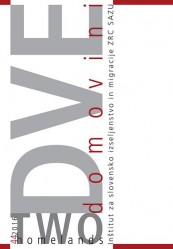Reclamation of Slovenian Identity by the Descendants of Slovenian Immigrants in the USA and Canada in the Context of the Global Trend of Individualization
DOI:
https://doi.org/10.3986/dd.2016.2.12Keywords:
global trends, individualization, Slovenian descendants, ethnic identity, search of rootsAbstract
In this article the author presents a phenomenon of individuals of Slovenian descent living in the United States and Canada, whose ethnic identity and connection with Slovenian ethnic community were either lost early in their lives, or were not even passed down to them by their ancestors, but were later (re)discovered. Life stories of individuals have been put into the context of the global trend of individualization and applied to this local case. The author examines what has motivated them to trace their roots, what this means to them today and how the discovery of Slovenian identity is reflected in their lives.
Downloads
References
Adams, Matthew (2006). Hybridizing habitus and reflexivity: Towards an understanding of contemporary identity? Sociology 40/3, 511–528.
Atkinson, Will (2010). Class, individualization, and late modernity: In search of the reflexive worker. Basingstone: Palgrave Macmillan.
Banks, Marcus (1996). Ethnicity: Anthropological Constructions. London, New York: Routledge.
Bernard, H. Russell (1995). Research methods in anthropology: Qualitative and quantitative approache. London: Altamira press.
Bauman, Zygmund (2001). The Individualized Society. Cambridge: Polity.
Beck, Ulrich (1983). Jenseits von Stand und Klasse? Soziale Ungleichheiten, gesellschaftliche Individualisierungsprozesse und die Entstehung neuer sozialer Formationen und Identitäten. Soziale Ungleichheiten (ur. Reinhard Kreckel). Gottingen: Otto Schwartz & Co (Soziale Welt, Sonderband 2), 35–74.
Beck, Ulrich, Beck Gernsheim, Elisabeth (2002). Individualization: Institutionalized individualism and its social and political consequences. London, Thousand Oaks, CA: Sage.
Bös, Mathias (2012). New Forms of Reflexive Ethnization: Value-Normative Universalism and Ethnic Particularism. Global Trends and Regional Development (ur. Nikolai Genov). New York: Routledge.
Crawford, James (2000). At War With Diversity: US Language Policy in an Age of Anxiety. Tonawanda, NY: Cromwell Press.
Čebulj Sajko, Breda (2000). Razpotja izseljencev: Razdvojena identiteta avstralskih Slovencev. Ljubljana: Založba ZRC.
Danilova, Elena (2012). Individualization under Precarious Conditions. Global Trends and Regional Development (ur. Nikolai Genov). New York: Routledge.
Davis, F. J. (1991). Who is black? One nation's definition. University Park: Pennsylvania State University Press.
Fazal, Shehina, Tsagarousianou, Rosa (2001). Diasporic Communication: Transnational Cultural Practices and communicative Spaces. Javnost – The Public 9, 1.
Genov, Nikolai (2008). Comparing Patterns of Interethnic Integration. Interethnic Integration in five European Societies (ur. Nikolai Genov). Hamburg: Krämer.
Genov, Nikolai, ur. (2012). Global Trends and Regional Development. New York: Routledge.
Genov, Nikolai (2015). Challenges of individualization. International Social Science Journal 64, 209–210.
Giddens, Anthony (1991). Modernity and self-identity: Self and society in the late modern age. Stanford: Stanford University Press.
Glazer, Nathan, Moynihan, Daniel, P. (1963). Beyond the Melting Pot: The Negroes, Puerto Ricans, Jews, Italians, and Irish of New York City. Harvard: The MIT Press.
Klemenčič, Matjaž (1995). Slovenes of Cleveland: A creation of a new nation and a new world community Slovenia and the Slovenes of Cleveland, Ohio. Novo mesto: Dolenjska založba.
Koderman, Miha (2015). Nazaj v domači kraj: Prostorske in turistične razsežnosti obiskovanja Slovenije s strani izseljencev in njihovih potomcev iz Avstralije. Koper: Univerzitetna založba Annales.
Koderman, Miha, Mihelič Pulsipher Lydia (2012). Social and Spatial Aspects of Root Tourism in Slovenia: The case of the Slovene-American Diaspora. Dve domovini / Two Homelands 35, 163–176.
Lamut, Urša, Macur, Mirna (2012). Metodologija družboslovnega raziskovanja od zasnove do izvedbe. Ljubljana: Vega.
Lukšič Hacin, Marina, Toplak, Kristina (2012). Teoretizacija multikulturalizma in etnične ekonomije v luči ohranjanja kulturne dediščine med migranti. Dve domovini / Two Homelands 35, 107–118.
Marentič, Požarnik, Barica (2001). Uspešna prenova terja enakopravnejši položaj »alternativne« raziskovalne paradigme in učitelja raziskovalca. Sodobna pedagogika 2, 64–80.
Milharčič Hladnik, Mirjam (2004a). Ohranjanje etnične identitete in tradicije med slovenskimi izseljenci in njihovimi potomci v Združenih državah Amerike. Dve domovini / Two Homelands 19, 121–140.
Milharčič Hladnik, Mirjam (2004b). Šolske izkušnje v multikulturnem okolju Združenih držav Amerike skozi zgodbe slovenskih priseljenk. Dve domovini / Two Homelads 20, 217–232.
Milharčič Hladnik, Mirjam (2005). Američanke. Dokumentarni film. Ljubljana: Televizija Slovenija.
Milharčič Hladnik, Mirjam (2007). Avto/biografičnost narativnosti: Metodološko teoretični pristopi v raziskovanju migracijskih izkušenj. Dve Domovini / Two Homelands 26, 31–46.
Milharčič Hladnik, Mirjam (2016). Nadzor nad nadzorom: Strategije upiranja in avtonomnost delovanja migrantk v sodobni in zgodovinski perspektivi. Dve domovini / Two Homelands 43, 35–46.
Mishler William, Pollack, Detlef (2003). On Culture Thick and Thin: Toward a Neo-Cultural Synthesis. Political Culture in Post-Communist Europe (ur. Detlef Pollack, Jorg Jacobs). Združeno kraljestvo: Ashgate.
NIC (2012). Global Trends 2030: Alterative Worlds. Washington D.C.: National Intelligence Council.
Puskas, Julliana (2002) The Magyars in Cleveland 1880–1930. Identity, Conflict and Cooperation (ur. David Hammack). Cleveland: Western Reserve Historical Society.
Waters, Mary (1990). Ethnic Options: Choosing Identities in America. Berkeley: University of California Press.
Žigon, Zvone (2004). Preservation of Ethnic Identity among Slovenian Emigrants in the Era of Globalization. Dve domovini / Two homelads 19, 25–36.
Downloads
Published
How to Cite
Issue
Section
License

This work is licensed under a Creative Commons Attribution-NonCommercial-NoDerivatives 4.0 International License.
Authors guarantee that the work is their own original creation and does not infringe any statutory or common-law copyright or any proprietary right of any third party. In case of claims by third parties, authors commit their self to defend the interests of the publisher, and shall cover any potential costs.
More in: Submission chapter





